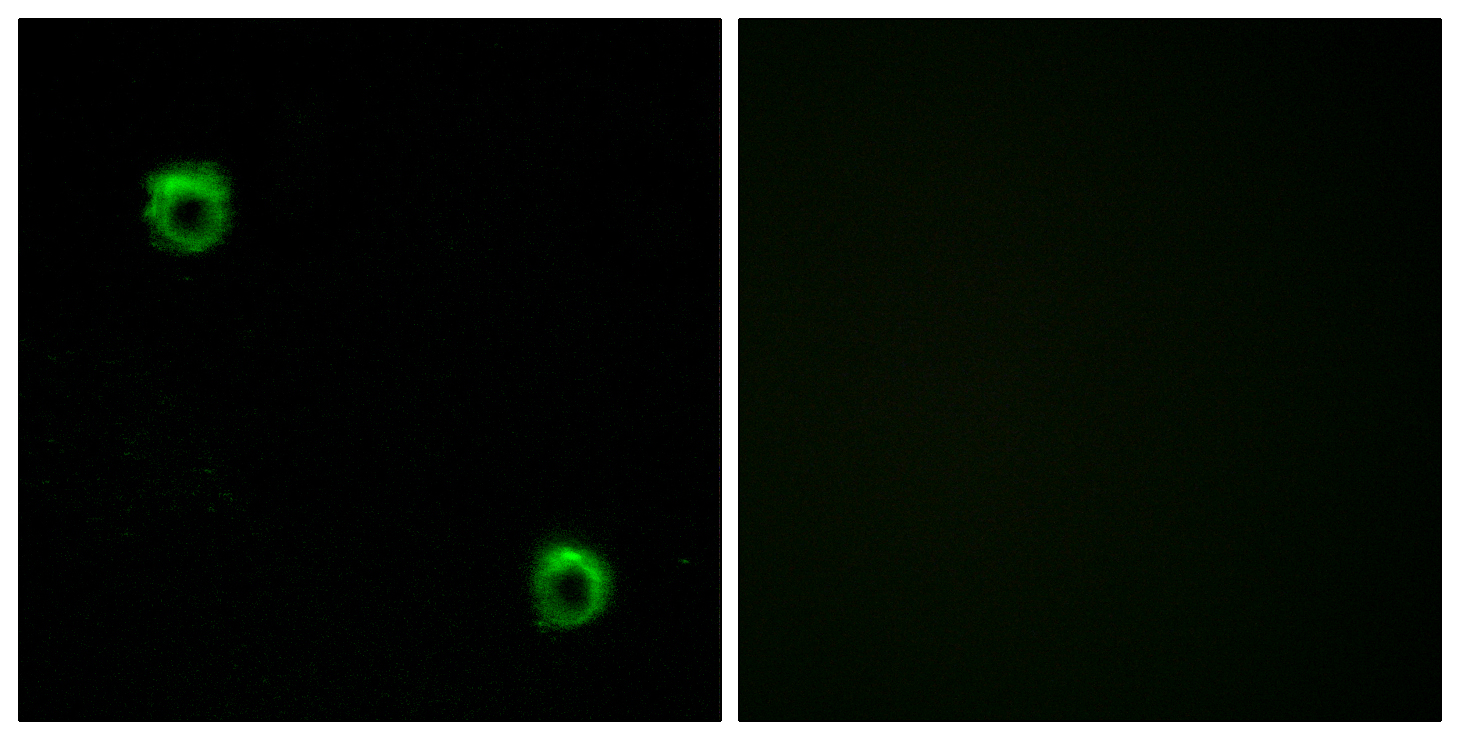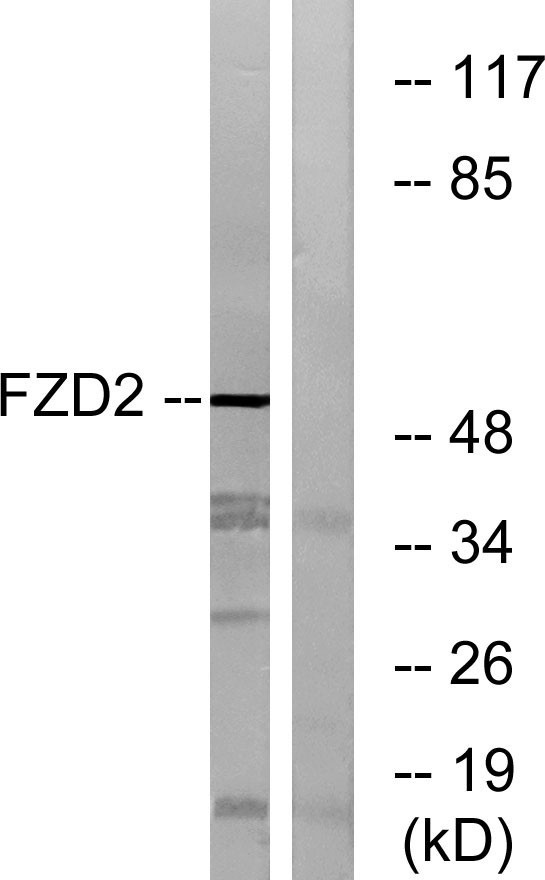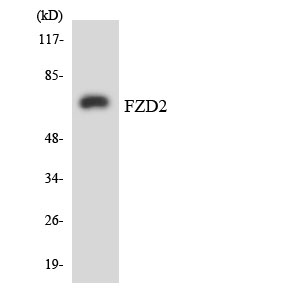Frizzled-2 Polyclonal Antibody
- Catalog No.:YT1776
- Applications:WB;IF;ELISA
- Reactivity:Human;Mouse;Rat
- Target:
- Frizzled-2
- Fields:
- >>mTOR signaling pathway;>>Wnt signaling pathway;>>Hippo signaling pathway;>>Signaling pathways regulating pluripotency of stem cells;>>Melanogenesis;>>Cushing syndrome;>>Alzheimer disease;>>Pathways of neurodegeneration - multiple diseases;>>Human papillomavirus infection;>>Pathways in cancer;>>Proteoglycans in cancer;>>Basal cell carcinoma;>>Breast cancer;>>Hepatocellular carcinoma;>>Gastric cancer
- Gene Name:
- FZD2
- Protein Name:
- Frizzled-2
- Human Gene Id:
- 2535
- Human Swiss Prot No:
- Q14332
- Mouse Gene Id:
- 57265
- Mouse Swiss Prot No:
- Q9JIP6
- Rat Gene Id:
- 64512
- Rat Swiss Prot No:
- Q08464
- Immunogen:
- The antiserum was produced against synthesized peptide derived from human FZD2. AA range:201-250
- Specificity:
- Frizzled-2 Polyclonal Antibody detects endogenous levels of Frizzled-2 protein.
- Formulation:
- Liquid in PBS containing 50% glycerol, 0.5% BSA and 0.02% sodium azide.
- Source:
- Polyclonal, Rabbit,IgG
- Dilution:
- WB 1:500 - 1:2000. IF 1:200 - 1:1000. ELISA: 1:40000. Not yet tested in other applications.
- Purification:
- The antibody was affinity-purified from rabbit antiserum by affinity-chromatography using epitope-specific immunogen.
- Concentration:
- 1 mg/ml
- Storage Stability:
- -15°C to -25°C/1 year(Do not lower than -25°C)
- Other Name:
- FZD2;Frizzled-2;Fz-2;hFz2;FzE2
- Observed Band(KD):
- 55kD
- Background:
- frizzled class receptor 2(FZD2) Homo sapiens This intronless gene is a member of the frizzled gene family. Members of this family encode seven-transmembrane domain proteins that are receptors for the wingless type MMTV integration site family of signaling proteins. This gene encodes a protein that is coupled to the beta-catenin canonical signaling pathway. Competition between the wingless-type MMTV integration site family, member 3A and wingless-type MMTV integration site family, member 5A gene products for binding of this protein is thought to regulate the beta-catenin-dependent and -independent pathways. [provided by RefSeq, Dec 2010],
- Function:
- domain:Lys-Thr-X-X-X-Trp motif is involved in the activation of the Wnt/beta-catenin signaling pathway.,domain:The FZ domain is involved in binding with Wnt ligands.,function:Receptor for Wnt proteins. Most of frizzled receptors are coupled to the beta-catenin canonical signaling pathway, which leads to the activation of disheveled proteins, inhibition of GSK-3 kinase, nuclear accumulation of beta-catenin and activation of Wnt target genes. A second signaling pathway involving PKC and calcium fluxes has been seen for some family members, but it is not yet clear if it represents a distinct pathway or if it can be integrated in the canonical pathway, as PKC seems to be required for Wnt-mediated inactivation of GSK-3 kinase. Both pathways seem to involve interactions with G-proteins. May be involved in transduction and intercellular transmission of polarity information during tissue morphog
- Subcellular Location:
- Membrane; Multi-pass membrane protein. Cell membrane ; Multi-pass membrane protein .
- Expression:
- Widely expressed. In the adult, mainly found in heart, placenta, skeletal muscle, lung, kidney, pancreas, prostate, testis, ovary and colon. In the fetus, expressed in brain, lung and kidney. Low levels in fetal liver.
- June 19-2018
- WESTERN IMMUNOBLOTTING PROTOCOL
- June 19-2018
- IMMUNOHISTOCHEMISTRY-PARAFFIN PROTOCOL
- June 19-2018
- IMMUNOFLUORESCENCE PROTOCOL
- September 08-2020
- FLOW-CYTOMEYRT-PROTOCOL
- May 20-2022
- Cell-Based ELISA│解您多样本WB检测之困扰
- July 13-2018
- CELL-BASED-ELISA-PROTOCOL-FOR-ACETYL-PROTEIN
- July 13-2018
- CELL-BASED-ELISA-PROTOCOL-FOR-PHOSPHO-PROTEIN
- July 13-2018
- Antibody-FAQs
- Products Images

- Immunofluorescence analysis of MCF7 cells, using FZD2 Antibody. The picture on the right is blocked with the synthesized peptide.

- Western blot analysis of lysates from HeLa cells, using FZD2 Antibody. The lane on the right is blocked with the synthesized peptide.

- Western blot analysis of the lysates from HepG2 cells using FZD2 antibody.



